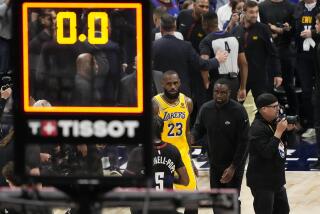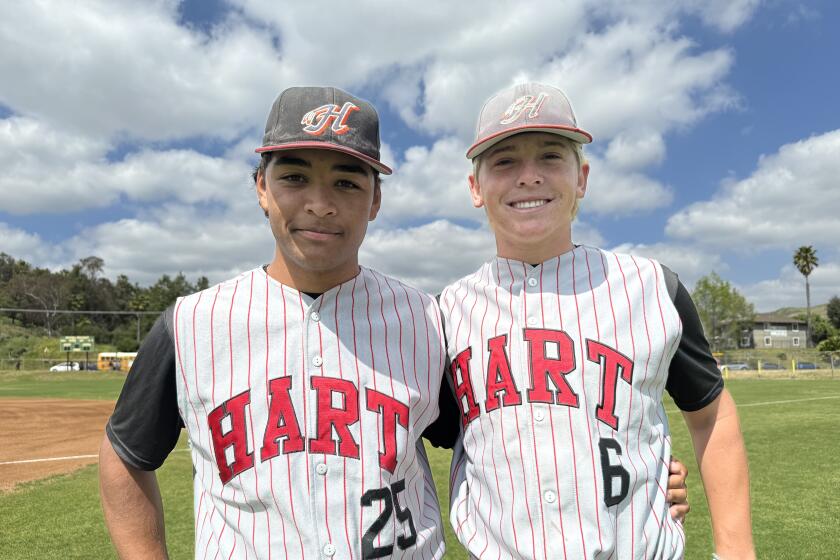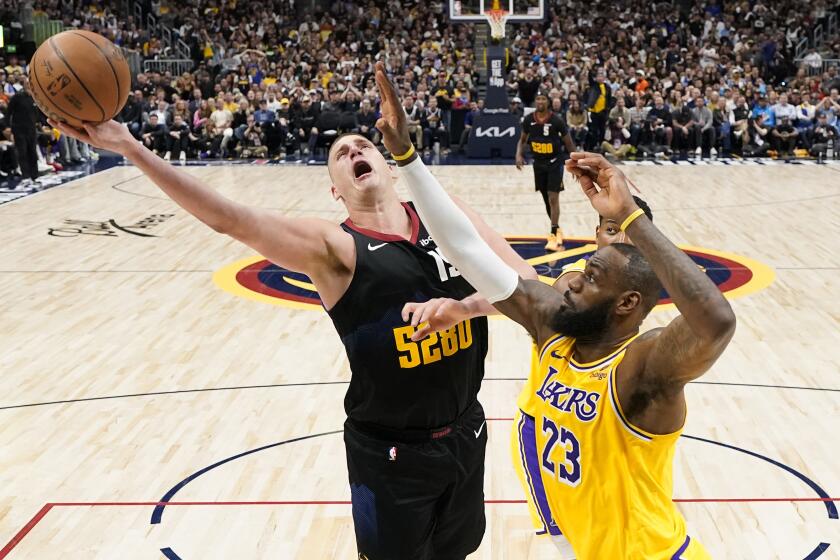Barry Bonds is convicted of obstruction of justice
Home-run king Barry Bonds was convicted of obstruction of justice for impeding a grand jury investigation into illegal steroid distribution, closing a sordid chapter in a scandal that ensnared some of baseball’s greatest players.
The verdict Wednesday against the former San Francisco Giants star capped a nearly seven-year probe that focused on Bonds’ denials under oath about knowingly using performance enhancing drugs.
Bonds, 46, sat grim-faced, showing no emotion when the verdict was read in a courtroom packed with reporters.
The jury of eight women and four men, which began deliberating Friday morning, also deadlocked on three counts of perjury.
The trial culminates an era that saw the reputations of some of the nation’s top athletes tarnished by disclosures of steroid and other drug use and that forced professional sports to grapple with calls for reform.
Jurors said they concluded that Bonds had been evasive before the grand jury, but they disagreed on whether he had lied to the panel about knowingly using steroids or human growth hormones.
One juror, a 60-year-old engineer who identified himself as Steve, said he was glad that the trial had taken place because he has a daughter who plays soccer.
“I’d like to see a level playing field,” he said after the verdicts were read.
The juror called the ballplayers who testified about their own drug use at the trial “true heroes.” He said: “I believe there is one man who just couldn’t do it because of who he is.”
Other jurors questioned the government’s case against the athlete.
“I think the government feeling was they had a really big fish with Bonds, and they wanted to finish what they started,” said jury foreman Fred Jacob, 56. “Maybe they tried a little too hard to make him look guilty.”
Defense lawyers said they would ask to have the obstruction of justice count set aside. They questioned how a jury could have found that Bonds tried to impede an investigation without finding that he lied.
U.S. District Judge Susan Illston set a hearing for May 20 to address that question and sentencing.
The probe into Bonds began with an investigation into a Bay Area laboratory that was selling illegal steroids to professional athletes and expanded to include athletes suspected of lying to investigators. Bonds, holder of baseball’s hallowed record for most home runs, was the probe’s highest profile quarry.
Bonds’ career record stands at 762 home runs, surpassing Hank Aaron and Babe Ruth.
“In terms of his legacy, it’s officially tainted,” said Robert Talbot, a professor at the University of San Francisco School of Law who has followed the trial. “It essentially says that he knew he was cheating.”
The verdict raises questions about Bonds’ chances for the Hall of Fame.
“If the conviction stands, that cannot help his chances,” said John Thorn, an official historian of major league baseball. If Bonds and others are left out of the Hall of Fame, he said, “that will be a sad and harsh verdict on their place in baseball history.”
Though federal sentencing guidelines for the conviction recommend 15 to 21 months in prison, many legal analysts expect Bonds to be sentenced to home confinement if the verdict is upheld.
The U.S. attorney’s office must decide whether to retry Bonds on the perjury counts.
Federal agents grew interested in Bonds in the early 2000s after learning he had appeared in an advertisement for the Bay Area Laboratory Co-Operative, which was selling designer steroids and other drugs to professional athletes.
Bonds was one of 30 athletes summoned to the grand jury investigating steroid dealing.
Although given immunity for illegal drug use, Bonds insisted that his personal trainer told him the two steroids he was taking were flaxseed oil and arthritis cream.
Prosecutors presented evidence to jurors that Bonds tested positive for a steroid and a fertility drug in a urine sample taken several months before his grand jury testimony. The government also presented a surreptitious recording of his personal trainer, Greg Anderson, discussing how he injected steroids in response to questions about Bonds.
Anderson refused to testify at the trial and was jailed for its duration.
He has spent nearly two years behind bars, mostly because he would not cooperate with the investigation into Bonds, a childhood friend.
Prosecutors said Bonds lied over and over again to protect his reputation.
Defense attorneys accused the government of waging a vendetta against Bonds and of using lying witnesses to try to convict him.
Jurors heard three key prosecution witnesses: Steve Hoskins, another childhood friend who was close to Bonds for 10 years until the two had a falling out in early 2003; Kimberly Bell, Bonds’ girlfriend of nine years; and Kathy Hoskins, Steve Hoskins’ younger sister, who said she was packing Bonds’ clothes for a road trip when she saw Anderson inject the ballplayer.
Jurors said they did not find Bell or Steve Hoskins credible; all but one found Kathy Hoskins believable.
Prosecutors also presented four major league ballplayers, including Colorado Rockies first baseman Jason Giambi and former Oakland Athletics player Randy Velarde, who testified that trainer Anderson supplied them with performance-enhancing drugs they said they knew were designed to boost performance and escape detection.
Jurors said they deadlocked on the three perjury charges: 11 to 1 in favor of guilt on whether Bonds lied when he denied that his former personal trainer had injected him; 9 to 3 in favor of not guilty on whether he lied about knowingly using steroids; and 8 to 4 in favor of not guilty on whether he lied about knowingly using human growth hormone.
Before Bonds’ trial, four other athletes were convicted of making false statements in the investigation.
Seven-time Cy Young Award winner Roger Clemens, accused of lying to Congress about steroids, faces trial in July.
Times staff writer John Hoeffel contributed to this report.
More to Read
Get our high school sports newsletter
Prep Rally is devoted to the SoCal high school sports experience, bringing you scores, stories and a behind-the-scenes look at what makes prep sports so popular.
You may occasionally receive promotional content from the Los Angeles Times.








